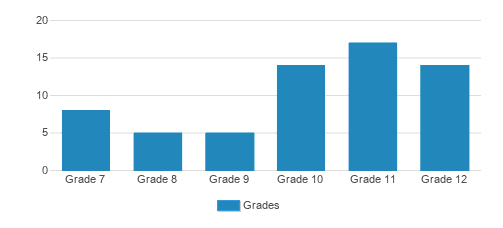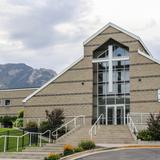Since 1992, Woodland Hills School has been an independent, non-denominational, private secondary school, serving grades 7 - 12.
Our faculty and staff are committed to providing the best possible educational environment for students to achieve their individual goals.
We stress a positive learning experience with challenges appropriate to unique styles of learning.
Our focus is to help non-traditional students achieve academic success, become independent thinkers, and become successful members of our society. For more information, please visit our website.
Quick Stats (2025)
- Grades: 7-12
- Enrollment: 63 students
- Application Deadline: None / Rolling
- Source: National Center for Education Statistics (NCES)
School Overview
School Membership(s)School Assoc.
Grades Offered
Grades 7-12
Year Founded
1992
Student Body
Total Students
63 students
Student Body Type
Co-ed
% Students of Color
6%
State avg.: 26%
Students by Grade

Academics and Faculty
Total Classroom Teachers
13 teachers
Student : Teacher Ratio
5:1
National avg.: 13:1
Tuition and Acceptance Rate
Admission Deadline
None / Rolling
School Notes
- Since its inception, Woodland Hills School has emphasized a strong academic program. Our curriculum is a liberal arts program using critical thinking and problem solving skills. By keeping our class size small, using positive follow up with each student from teachers and counselors, and solid communication with parents, we are able to address the unique learning differences in each of our students. We try to focus on the individual strengths and areas of interest to motivate and spark a positive self-concept in each student. The unique program and curriculum at Woodland Hills School allows students to develop skills that will help them to become responsible, independent thinkers. As they become life-long learners, they develop a deeper sense of self and the ability to relate to others. We believe that while academic success is very important, it is just a portion of a self-reliant individual. Through our individualized teaching methods, a foundation is laid for our students to become ethical, contributing members of society. Woodland Hills School is fully accredited by the Northwest Association of Accredited Schools. The NAAS is the principle standard of academic regulation for the public schools and other high quality private schools in the western United States. In fact, according to the Accreditation Visiting Team, "the school provides a quality educational program for its students based upon clearly defined goals and objectives that are appropriate for the unique school population served . . . Indeed, this school knows its business."
Source: National Center for Education Statistics (NCES)
Frequently Asked Questions
When is the application deadline for Woodland Hills School?
The application deadline for Woodland Hills School is rolling (applications are reviewed as they are received year-round).
School Reviews
Endorse Woodland Hills School. Endorsements should be a few sentences in length. Please include any comments on:
- Quality of academic programs, teachers, and facilities
- Availability of music, art, sports and other extracurricular activities
- Academic or athletic awards
Recent Articles

A Parent's Guide To Understanding High School Teaching Methods
This comprehensive guide helps parents navigate the various teaching methods used in today's high school classrooms. By understanding these approaches, you'll be better equipped to support your teen's learning journey, communicate effectively with teachers, and create a complementary learning environment at home.

February 08, 2025
Social Emotional Learning: Education's Hidden SymphonyA musician's perspective on Social Emotional Learning reveals how this educational framework orchestrates success through five essential emotional competencies.

January 24, 2025
A Roadmap For Starting A Private SchoolUse this roadmap as a set of talking points with your trusted mentors and professionals to start the private school of your dreams. You're not alone. Over the years, hundreds of folks like you have had the same dream. From Quintilian to Maria Montessori to Lucy Madeira Wing, visionary educators have established schools to teach according to their beliefs and methodologies.























